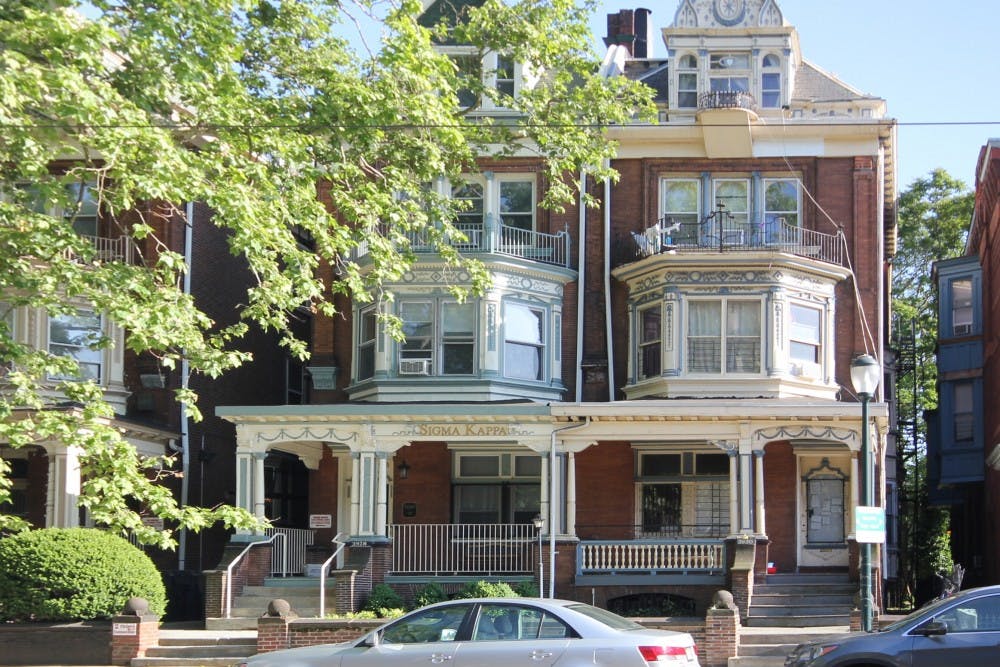
File Photo
Leaders of on-campus Greek organizations are concerned that a future requirement for sophomores to live on campus will make it difficult for them to fill their chapter houses.
In three years, beginning with the Class of 2024, all undergraduate sophomores will be required to live in college housing. This policy change was reported by The Daily Pennsylvanian and announced in an email to the Penn community that was co-signed by University President Amy Gutmann and Provost Wendell Pritchett.
Sophomores typically make up a large percentage of residents in on-campus Greek houses, but under the new policy they will no longer be allowed to live in them. Greek leaders expressed worry that this could potentially lead to increased dues and push students to join off-campus organizations.
College junior George Costidis, who is the president of the Pi Kappa Alpha fraternity, said the University requires each on-campus Greek house to fill a certain number of beds. Those that fail to do so face sanctions and could lose their leases. Without sophomores, Costidis said, organizations will have much more difficulty filling their housing quotas.
College senior Kyler McVay, Penn Panhellenic’s vice president of community development, agreed.
“One of the reasons we’re so concerned is that Greek houses are for sophomores,” she said, adding that it’s hard to incentivize juniors and seniors to live in them.
McVay added that for sororities, failure to fill houses could lead to an increase in dues, which are fixed by the national organizations.
Leaders of Greek organizations are also concerned that the policy change could have a negative social impact.
“Not having members around the house leads to decreased membership and a worsened brotherhood experience and unity between the sophomores and all the other classes,” Costidis said.
In a guest column published in the DP, College junior and Interfraternity Council Vice President Brian Schmitt argued that Greek housing should fall under the umbrella of on-campus housing. He wrote that the current plan would result in a substantial increase in fraternity dues, creating a culture of financial exclusivity.
In the column, which was published with the help of the IFC board, he contended that this decision inaccurately assumes on-campus Greek organizations are harmful to mental wellness.
Both Schmitt and McVay criticized the idea that the change would address the problem of off-campus organizations. While speaking to student leaders on Tuesday, Pritchett explained that the policy change follows a recommendation put forth by the Task Force on a Safe and Responsible Campus Community, which was established after an off-campus fraternity, OZ, sent sexually suggestive emails to freshman women two years ago.
The two Greek leaders argued that rather than acting as a deterrent, the new rules could drive more students to off-campus organizations.
“A house is a huge incentive to join an on-campus frat or sorority,” McVay said. “It’s a home base. And when you don’t have that anymore, that just drives more students to join off campus Greek life.”
Costidis, also a DP sports reporter, added that the new rule is the latest in a series of changes, such as the decision to close Huntsman Hall at 2 a.m., where the administration is “doing things that I don’t believe the student body wants and needs at this time.”
"There are plenty of areas the University can improve on," Costidis said, "and a policy like this just distracts us and them from the real problems at hand."
Senior News Editor Sarah Fortinsky contributed reporting.
The Daily Pennsylvanian is an independent, student-run newspaper. Please consider making a donation to support the coverage that shapes the University. Your generosity ensures a future of strong journalism at Penn.
Donate







